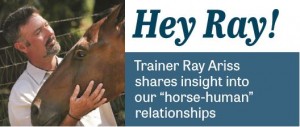 HEY RAY! I’m looking to buy a horse and I’m really concerned about ending up with a ticking time bomb when what I need is a bomb-proof horse. Do you have any tips for me or red fl ags to look out for, since I can’t aff ord to take a professional with me? –Karen Hutt on, Apple Valley
HEY RAY! I’m looking to buy a horse and I’m really concerned about ending up with a ticking time bomb when what I need is a bomb-proof horse. Do you have any tips for me or red fl ags to look out for, since I can’t aff ord to take a professional with me? –Karen Hutt on, Apple Valley
HEY KAREN: I hate to tell you, but if you hope to end up with the right horse, you can’t afford not to take a professional with you. If you are looking to save a few bucks, you can do most of the running around until you narrow down the list to the two or three favorite horses that should be looked at by your trainer of choice. Believe me when I say, the best money you will ever invest in your horse will be the evaluation given by your professional. Part of that evaluation should include you riding one of the trainer’s lesson horses so that he may get a clear picture of the type and level of rider he will be buying for. The horse that you should see first with your trainer should be the one at the top of the list, and work down from there. That way you might get lucky and end up with your favorite horse and only pay for one pre-purchase evaluation. Here are some suggestions that should facilitate the process in finding your dream horse:
A. Have a clear picture of the kind of horse you would like to get for your particular needs. Then make a list of all the things that you would like your horse to be, in order of importance. An example would be: 1) Breed 2) Disposition 3) Size 4) Movement 5) Comfort 6) Conformation 7) Soundness 8) Color 9) Training, etc.
B. Try to give a grade to each quality above to the best of your ability.
C. Try to trust your instincts. The first feeling, picture or impression you get the moment you lay eyes on the horse should be remembered because it should be an important deciding factor on whether you continue with the evaluation or simply turn around and leave. You will actually be doing the owner of the horse and yourself a favor by not prolonging time spent on the wrong horse.
D. Only continue the evaluation process with those horses that keep you interested in finding out more.
E. In your case, disposition will be an area where you will have to truly trust your instincts on how comfortable and safe the horse makes you feel.
F. Pay close attention to the little things the horse does while in your presence when he is being handled in every situation.
G. Do not handle or ride any horse unless you have seen him perform with someone else first in a way that makes you feel comfortable.
H. Ask the horse’s owner questions that may help you decide if this is the right horse.
I. Have the owner put the horse through some revealing situations in order to reinforce some of the questions you may have asked him about the horse. Example: How is he at…tying, flagging, tarping, bridling, saddling, clipping, bathing, loading, mounting, trail riding, lunging, leading, etc.
J. Once you have decided upon your top three horses, proceed to make appointments with your trainer and the horse’s owner. Make sure your trainer has a plan on how he will approach the evaluation that is clear to you. You should decide ahead of time if you or your trainer will be negotiating the sale of the horse. Try to negotiate for the best price possible—but if it is the right horse, don’t let him get away! Allow your trainer to do his job in order to discover “The One”.
Karen, your biggest challenge by far will be being lucky enough to recognize the right horse for you. When that happens, price is usually not the issue. But don’t worry, it’s worth it. In the long run, it’s the cheap way out. At the end of it all, remember to trust your instincts and think safe because the final decision should be yours,
–Ray
Horsetrader columnist Ray Ariss, husband to Pippa Ariss and father of six, shares his insight into the relationship of horse-and-human each month, in print and on www.horsetrader.com.
Leave a Comment
All fields must be filled in to leave a message.